1. Saved by the Bell

Before we jump into how wild our everyday sayings really are, let’s start with one that sounds harmless but began in pure fear. “Saved by the bell” wasn’t about boxing or school bells. In the 18th and 19th centuries, people were terrified of being buried alive, so coffins were fitted with strings that ran to bells above ground. If someone woke up underground, they could ring for help. It was a real safety feature against premature burial. Over time, the phrase shifted from literal rescue to a lucky escape from any kind of trouble. So next time you’re called “saved by the bell,” just remember it once meant being saved from the grave itself.
2. Kick the Bucket
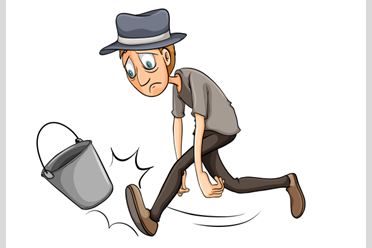
When someone “kicks the bucket,” it sounds oddly casual for what it really means. This saying began in slaughterhouses, where animals were hung from a wooden beam called a “bucket.” When they died, their legs would thrash against it, creating the image that gave us today’s phrase. It’s grim if you think about it, but humans have a funny way of softening dark ideas. Over time, it became a polite, even humorous euphemism for death. People often use it jokingly, not realizing it came from the noise of life’s final kicks. Still, it shows how language turns pain into something more manageable, one phrase at a time.
3. Break the Ice
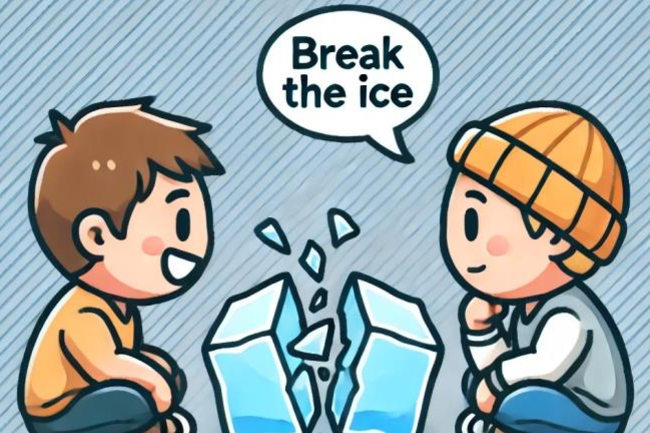
In old times, when trading ships got trapped in frozen harbors, smaller boats had to “break the ice” first so others could move through. This practical task soon became a metaphor for easing tension between people. To “break the ice” now means to spark a conversation or make someone feel comfortable. It’s one of those phrases that crossed from hard labor into human connection. The idea of clearing a path for ships turned into clearing space for dialogue. Whether in meetings, dates, or first encounters, breaking the ice still helps everyone move forward. It’s proof that even cold beginnings can lead to smoother sailing.
4. Mad as a Hatter

When someone acts a little offbeat, we call them “mad as a hatter,” but that phrase began with a tragic truth. In the 18th and 19th centuries, hat makers used mercury to stiffen felt, and long exposure poisoned them. Symptoms like tremors, anxiety, and confusion made them seem insane to others. The condition even became known as “hatter’s disease.” Eventually, the phrase stuck, capturing the strange mix of humor and sadness that often shapes our language. Though it later gained fame through Lewis Carroll’s Alice’s Adventures in Wonderland, its roots remind us that madness was once occupational, not whimsical.
5. Spill the Beans

If you’ve ever “spilled the beans,” you’ve shared a secret a bit too soon. The phrase comes from ancient Greece, where people voted using beans, white for yes and black for no. If someone accidentally tipped over the container before counting, everyone could see the results early. It ruined the secrecy, just like gossip does today. The idea of spilling something hidden stuck around and found its way into English speech centuries later. Now it’s less about democracy and more about carelessness, but the connection remains. Whether it’s about revealing plans or blurting out news, a few spilled beans can still cause a stir.
6. Caught Red-Handed
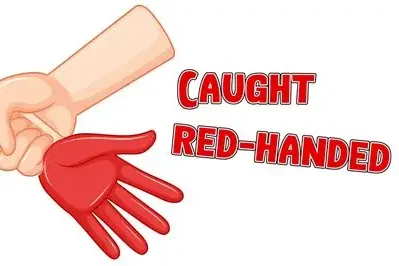
Being “caught red-handed” once meant far more than simple embarrassment. The phrase originated in old Scotland, where someone caught with blood on their hands after a crime, usually poaching or murder, was instantly guilty. The evidence was right there for all to see. Over time, the term left the courtroom and entered everyday life. Today, it covers everything from sneaking snacks to getting caught lying. Yet its origins remind us that once upon a time, guilt was literally visible. It’s one of those phrases that grew softer with time, proof that while crimes change, the feeling of being caught never really does.
7. Bite the Bullet

Before painkillers existed, soldiers on the battlefield had little choice during surgery but to “bite the bullet.” The idea was simple: biting something tough helped them bear the agony without screaming or thrashing. It became a symbol of courage through suffering. The phrase later entered common speech, meaning to face a difficult situation bravely. It’s funny how language preserves old realities, turning moments of horror into lessons in resilience. Nowadays, no one needs a bullet to get through challenges, but the phrase still reminds us to stay strong when life hurts. It’s a bit grim, but beautifully human.
8. Let the Cat Out of the Bag
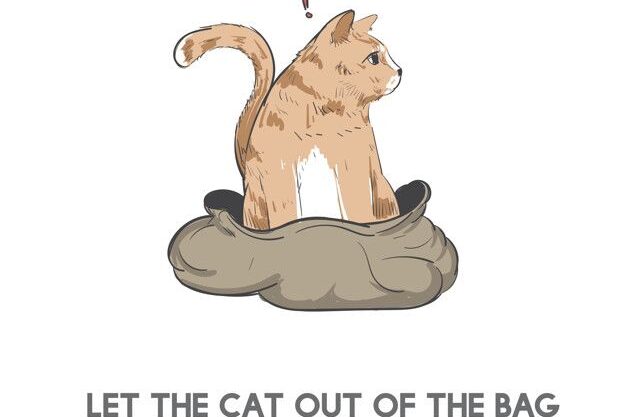
Picture a medieval market where piglets were sold in bags. Dishonest sellers sometimes swapped pigs for cats to cheat buyers. If someone opened the bag early, they’d “let the cat out,” exposing the trick. Over time, the phrase came to mean revealing a secret too soon. It’s a small reminder that even centuries ago, people used clever words to warn against deception. While we no longer buy pigs in sacks, the lesson sticks, truth eventually escapes no matter how tightly it’s tied. Every time we “let the cat out of the bag,” we echo a warning from the market stalls of old.
9. Butter Someone Up

If you’ve ever “buttered someone up,” you’ve followed a tradition older than most realize. In ancient India, worshippers offered butter balls to statues of gods to gain favor. It was literally an act of flattery, meant to please divine beings. The gesture spread into language, turning from physical offering to spoken praise. Today, it simply means showering someone with compliments to get what you want. The phrase carries a playful reminder of how far people will go to seek approval. Whether it’s for love, luck, or a raise, a little “butter” still works its magic.
10. Rule of Thumb

The “rule of thumb” sounds harmless, but its origins are debated. Some say it came from an old English law allowing men to hit their wives with sticks no thicker than their thumbs, though historians argue that version might be exaggerated. Another theory says it came from craftsmen using their thumbs for rough measurements before modern tools. Either way, the phrase evolved into meaning a simple guideline rather than a strict rule. It’s proof that some sayings survive controversy by adapting to new meanings. Sometimes what starts dark ends up practical, showing how culture reshapes language to fit the times.
11. Going Cold Turkey

When someone quits something suddenly, they’re said to be “going cold turkey.” The phrase likely comes from the clammy, goosebumped skin of those experiencing withdrawal, which resembled the texture of a cold turkey. It’s an unpleasant comparison but an accurate one. Over time, it became a way to describe facing change head-on without easing into it. Whether giving up smoking or bad habits, “cold turkey” means full stop, no comfort included. It’s a rough image, but it captures the struggle perfectly, proof that language often borrows the physical to express the emotional.
12. Sleep Tight

Before cozy mattresses, people slept on rope beds that needed tightening to stay firm. A loose bed meant a bad night’s rest, so “sleep tight” was literal advice. Tight ropes meant steady support and comfort. Over time, the saying evolved into a gentle wish for peaceful sleep, often paired with “don’t let the bedbugs bite.” What once came from practical maintenance turned into affection. It’s amazing how simple habits from the past shaped today’s bedtime rituals. Even without ropes, the wish to “sleep tight” still feels like care woven into words.
13. Under the Weather
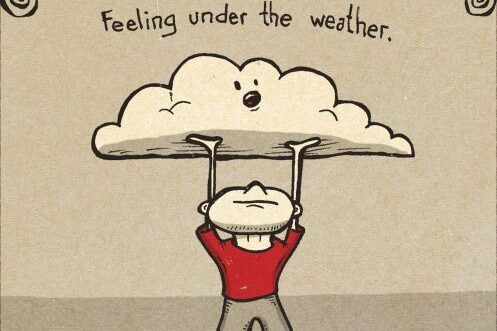
Sailors first used this phrase to describe being sick while at sea. Rough winds and waves could make anyone ill, and those affected were sent below deck, literally under the weather. Away from the storm, they could rest and recover. The phrase later left the ocean behind but kept its meaning. Saying you’re “under the weather” still carries that image of retreating somewhere safe to heal. It’s one of those quiet reminders of how much of our language floats on nautical history. Even now, feeling unwell still feels a bit like riding out a storm.
14. Cat Got Your Tongue

When someone goes silent, it’s easy to tease with “cat got your tongue?” But the phrase may have started in cruelty. Some say it came from the British Navy’s “cat-o’-nine-tails” whip that left victims speechless with pain. Others link it to ancient punishments where liars’ tongues were supposedly given to cats. Regardless, the phrase softened over centuries into a harmless, playful question. It’s strange how words rooted in fear can evolve into humor. Today, it’s a lighthearted nudge for conversation, a reminder that even the darkest origins can become simple laughter.
15. Passing the Buck
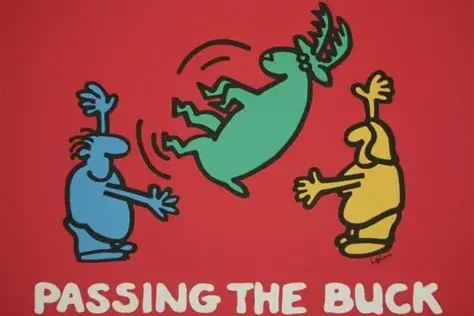
In 19th-century poker, players used a marker called a “buck” to show whose turn it was to deal. If someone didn’t want the responsibility, they could “pass the buck” to the next person. The phrase soon spread beyond cards to describe shifting blame. When President Harry Truman said, “The buck stops here,” he flipped the meaning entirely, using it to show accountability. That twist gave the phrase new life. Whether in games or leadership, it’s still about choice, either take responsibility or keep passing it along.
16. Cold Feet

“Cold feet” has long meant sudden hesitation, but its origins remain fuzzy. Some say it described soldiers too frostbitten to march forward, others think it came from gamblers too broke or nervous to play. Both ideas fit the image of losing nerve when it matters most. The phrase captures the uncomfortable chill of fear itself, the kind that freezes action. It’s a gentle way to describe doubt without judgment, reminding us that even the bravest people sometimes hesitate. After all, a little cold feet means you cared enough to think twice.
17. Scapegoat

The phrase “scapegoat” began in ancient Jewish rituals, where a goat was symbolically burdened with the sins of the community and sent into the wilderness. The idea was that it carried away guilt, leaving people cleansed. Over time, it took on a broader meaning, describing anyone unfairly blamed for problems. The word blends sacrifice and injustice in one simple image. Today, it shows how easily we still look for someone to blame when things go wrong. It’s a phrase that hasn’t lost its weight, even centuries later.
18. Pulling Someone’s Leg
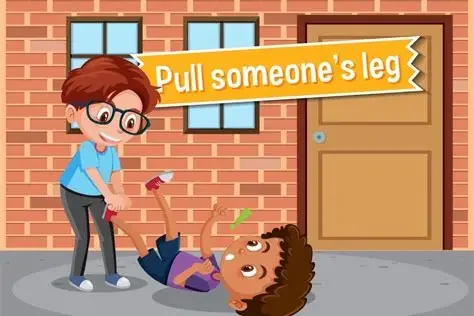
This phrase began on rough London streets. In the 18th century, thieves were said to pull people’s legs to trip and rob them. It wasn’t funny then, but time softened the meaning. By the 1800s, it turned into a way to describe harmless teasing instead of actual mugging. Language has a way of polishing rough edges until only humor remains. Now, when we say we’re “pulling someone’s leg,” it’s just playful banter, not a crime. It’s funny how the same words that once meant danger now bring laughter instead.
19. Close but No Cigar
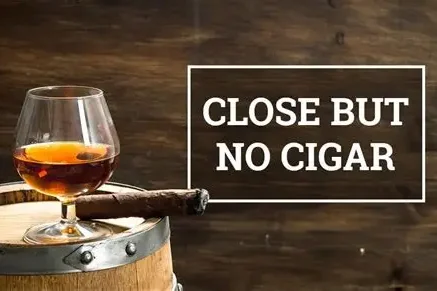
At early twentieth century carnivals, cigars were common prizes for booth games. If you nearly hit the target but missed, the barker might say close but no cigar to mark the loss. The line survived long after cigars disappeared from midway prizes, becoming a friendly way to acknowledge an almost success. People like it because it gives credit for effort while still telling the truth. It softens disappointment with a wink, which is why sports fans and teachers still use it. The phrase also reminds us that rewards often require precision, not just enthusiasm. Still, almost can be a useful teacher. You adjust, try again, and sometimes the next throw finally lands. And when it does, the smile feels earned.
20. Wild Goose Chase

A wild goose chase did not start with people running after birds. It named a kind of horse race where riders followed a lead horse at changing distances, forming a loose flock shape across the field. Shakespeare used the phrase in Romeo and Juliet, helping it move toward the meaning we use today. Over time it came to describe a pursuit that is unlikely to succeed, especially when the goal keeps moving. Even so, the image carries a spark of optimism. You are still in motion, still learning the ground, still tracking a pattern. Sometimes the wrong trail teaches the right lesson, and the next chase ends with a real catch. That small hope keeps wanderers moving toward better paths.
21. Toe the Line
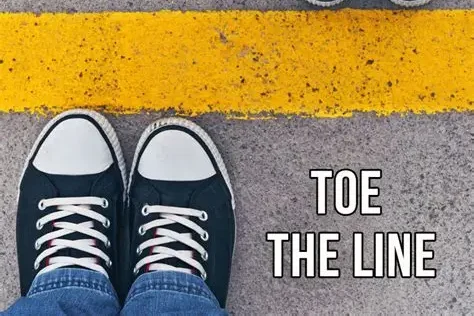
This phrase started in the navy, where sailors were required to stand in perfect formation with their toes touching a marked seam on the deck. It symbolized discipline and obedience. “Toe the line” later entered politics and society as a metaphor for following rules or expectations. Many people mistakenly say “tow the line,” but the truth lies in those toes. It’s one of those quiet phrases that turned physical precision into moral or professional alignment, proof that language often anchors respect in the simplest actions.
22. Show Your True Colors

A ship at sea could fly a false flag to confuse an enemy, but before fighting it had to raise its real flag and reveal its true colors. That rule of engagement created a clear expectation about honesty in battle. The phrase left the quarterdeck and settled into everyday speech, where it now describes revealing who you really are. It often arrives at turning points, when pressure strips away polite poses. Sometimes that unveiling is disappointing, and sometimes it is a relief. Either way, the truth gives everyone firmer footing. Once colors are known, trust can be rebuilt, decisions can be made, and progress becomes possible without guessing. Clarity may sting at first, yet it steadies hearts and plans forward.
23. Pot Calling the Kettle Black

This phrase comes straight from old kitchens where pots and kettles turned black with soot from open fires. For one to insult the other’s color was the height of hypocrisy. The image was so clear it became a timeless expression for people criticizing others for faults they share. It’s stayed relevant for centuries because it mirrors human nature perfectly. We notice others’ flaws long before our own. Maybe that’s why it still rings true today, a gentle reminder that before pointing fingers, we should check for soot on our hands too.
This story 23 Everyday Phrases with Totally Bizarre Origins was first published on Daily FETCH


